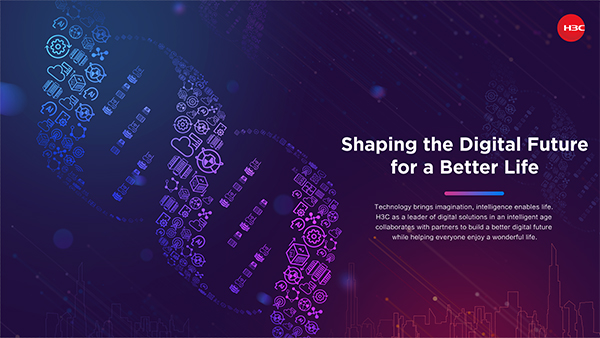Digitalization as a means of propelling enterprises in the modern digital economy
With the development of Artificial Intelligence (AI), Internet-of-Things (IoT), cloud computing, 5G and other cutting-edge technologies, digitalization is accelerating the evolution of enterprises’ methods of operation. In fact, the international market research company, IDC, predicted that by 2022, the digital economy will account for 60% of the world’s total economy. With the global impact of the COVID-19 pandemic, the necessity for digitalization has become even more of a significant priority for many enterprises.

Digitalization has brought profound impact to every industry, and industries are confronted with the brand new challenges brought by digitalization when new technologies are advancing the industrial development. In this new era, digital solutions that integrate technological innovation, scene applications and ecology cooperation can better energize the digital economy, and create a promising and lively digital future.
H3C, an industry leader in the provision of Digital Solutions founded in 2003 in China, understands this new growing digital solutions demand and is committed to becoming the most trusted partner of their enterprise customers in their quest for business innovation and digitalization. H3C will bring its expertise and experience working with its partners, not just in China but globally as well.
As the word itself is being used more widely in the mainstream, what is digitalization? Digitalization refers to enabling or improving processes by taking advantage of digital technologies and digitized data. An example of this involves leveraging AI, IoT, and cloud computing to increase business productivity and efficiency while reducing costs. Digitalization improves an existing business process but does not change them. In other words, it takes a process from a human-driven event to a software-driven one.
This is where corporates which are looking to be digitalized need the help of H3C. We are a leading ICT solution player which offers a wide range of ICT product portfolio including digital infrastructure products, storage, networking, 5G, security and other related domains. In essence, digitalization is the process of integrating digital technology into all areas of the business to stay competitive and relevant in this digital age.
Today, we are living in an age that is dominated by technology. People from all over the world are connected to each other in one way or another. Industry players, be it public or private, must understand that in order to meet the modern demands of consumers, they have to begin digitalising their business operations. This is one of the most important reasons why digitalization matters.
Large enterprises are complex by design. Operation is wide-ranging and it takes place in multiple locations with many pieces of software and hardware. To move forward they must embrace digital change or risk getting left behind with consequences on costs and further pressure on service delivery. Digital transformation allows the centralisation of data and access to that data in a way that facilitates new practices around agility, innovation and efficiency which suits each unique individual and their role.
Globally, there are many instances of digitalization that have taken place. In healthcare, big data analysis, AI, cloud computing services and other digital platforms, many new digital services have been used in controlling the current COVID-19 pandemic. As an example, digitalization is used in contact tracing and has helped in identifying potential patients. This digital effort has no doubt contributed to containing the spread of COVID-19.
Aside from healthcare, other sectors have also been revitalized by digitalization. Some of the fascinating industries where digitalization has made a massive improvement in methods of operations includes agriculture. Rice, food crops, rubber, and palm oil, are some of the main agricultural products in Malaysia. Agriculture plays a crucial role in an economy like Malaysia, both for exports and local consumption. Occupying a dominant position in the Malaysian economy, it is the backbone of the country, providing raw material, food, export revenue and employment opportunities. Being one of the largest sectors in both our local and global economies, it is facing challenges in a rapidly evolving world.
Digital technologies and analytics are transforming agriculture, making a farm’s field operations more insight-driven and efficient. Digital-based farm services are helping to improve financial performance and boost yield. By generating detailed insights into operations and the environment, it assists farmers in making data-based operational decisions to optimize yield and boost revenue while minimizing expenses, the chances of crop failure, and environmental impact.
The development of digital is changing the finance industry in many ways. Technologies like cloud computing, analytics, and robotics are among the most innovative digital tools revamping the core of banking and finance. Now, human error is less likely as machine learning and robots take over. People have financial management at their fingertips, and digital is at the heart of all interactions. From mobile banking apps and smart ATMs to virtual assistants and chatbots, the future of finance and banking is already quickly taking shape.
Sooner rather than later, human staff will be reduced to a minimum in banking. Not only can the robots do the job faster, there is also widespread consensus that they can offer a superior user experience. According to the global professional services company, Accenture, almost 80% of bankers think advancements in AI will enable banks to offer a “human-like customer experience”, and 76% believe the robots will lead the way in customer interaction within the next three years.
Even in an industry such as law which was seen as slow to catch up, digital technology has had a significant impact over the past several years. With the rise of the Internet, the average layman has a much larger access to legal information than they had over the past several decades. Lawyers once did all of their legal research using books. However, now most of that research is done electronically with legal research databases such as Westlaw and LexisNexis. Recently, several technologies are changing their legal profession on a significant basis. One of the biggest steps that has enabled technology in law to evolve is the digitalization and storage of case law, statutes, and regulation. This has enabled technology firms to aggregate, store, and provide statistics about the law in a way that we have not seen in the past.
Against the backdrop of the vigorous development of the global digital economy, the demand for digital and intelligent transformation has always existed and continues to grow for each industry in many countries around the world. The emergence of the COVID-19 pandemic has made more industrial players recognize the urgent need for digital transformation. On the other hand, despite the fact that the epidemic will impose pressure on economic development, digitalization will have a significantly positive effect on post-epidemic recovery, from the increase of employment to industrial upgrading of enterprises.
From self-driving trucks, automated machines for factories, big data analytics to provide predictive behaviour, to AI and machine learning, there is no industry that is safe from the coming disruption of digitalization, and one either adopts and thrive or is left behind. Digitalization is not to be accomplished at one stroke; it is a long-term endeavour that involves company culture, organizational process, business model and personnel capability.

With the aim of expanding on the global stage, H3C is here in Malaysia to help enterprises digitalize. We provide a comprehensive one-stop digital platform that includes cloud computing, big data, AI, industrial internet, information security, intelligent connectivity, new safety, and edge computing, as well as end-to-end technical services. To date, H3C has seven subsidiaries in Malaysia, Thailand, Indonesia, Japan, Russia, Pakistan and Kazakhstan.
“Shaping the Digital Future for a Better Life” is the corporate vision of H3C. We believe in helping industries make smarter business decisions, create more agile business deployments, provide more reliable business assurances and create a safer business environment among other core abilities. This will lead to a higher level of digitalization.

